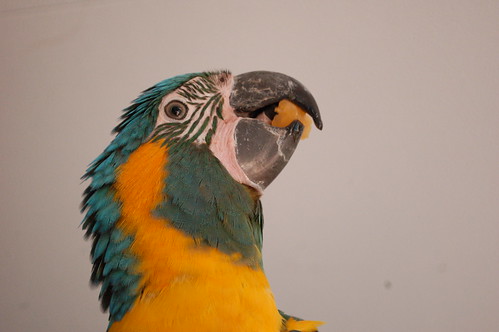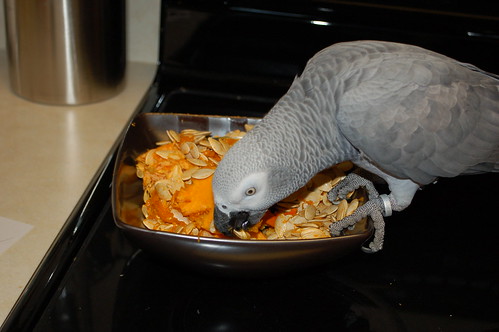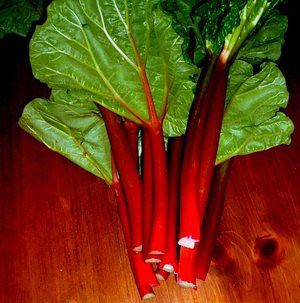
There are always so many questions about the foods which are, or are not, appropriate in a parrot’s diet. I apologize for repeating this so many times in my posts, but I firmly believe that diet is the most important part of our parrot’s daily care. Everything else you try to accomplish for your bird is lost on an energy-less, ill-feeling bird if you fail in this one area. Without good health, a parrot’s life is, at best, not all it can be, and at worst, a tragedy waiting to happen.
The list of should/can feed items is very long. Fresh fruits and veggies should be the biggest part of the daily diet. Grains (cooked and raw) and legumes (only cooked or sprouted), pastas, nuts and pellets should also be worked into the diet regularly.
More important is the list of foods that are dangerous. It is a short list, but it is imperative that we be aware of those things which are hazardous to our birds.

It is incorrect to assume that parrots innately know which foods are dangerous for them. In fact, a parrot learns these things from their parents and flock mates in the wild. Most of our birds have not had that advantage. Even our wild caught birds are being fed a captive bird diet and the foods that we give them are not the same as those they would have been exposed to in their native lands. So any of their acquired wild knowledge, should they retain it, is irrelevant.
To keep things simple, I will address only the foods that are known to be toxic, foods to be avoided (even though many of these are debated), and the parts of acceptable foods that should be removed when you serve them.
Following is the list of foods you must NEVER let your bird eat or drink:
- Avocado – The pit and skin are the most toxic parts of the avocado, but even the flesh can kill a bird within minutes. I know of a few instances where this happened to birds after being fed guacamole by their unaware owners.
- Chocolate – Contains the compound theobromine, which speeds up the metabolism. The darker chocolates containing a higher percentage of cacao, which are also the more pricey chocolates, are the most dangerous. Chocolate toxicity can be fatal.
- Caffeine – This speeds up the metabolism in an animal with already high metabolic rates. It can bring on cardiac distress and death.
- Alcohol – Alcohol depresses the organ system and can be fatal, even in small amounts.
- Salt/Sugar – Sodium (salt) is a necessity in all living creatures. However, too much salt can bring on dehydration and kidney dysfunction. The different foods we eat contains both salts and sugars naturally. It is unnecessary and unsafe to add these ingredients to our bird’s foods.
- Raw honey – This contains fairly high levels of botulism and should not be fed to birds or infants. Used pasteurized honey instead.
5/19/11
**Note regarding pasteurized honey: One of our readers brought forth a very good point and one that I hadn’t considered. For honey to truly be pasteurized, it would have to be heated to temperatures that would change the consistency, caramelizing it into a near solid instead of the syrup we are familiar with. Therefore, it is not possible that it is pasteurized. She stated that in Canada, labeling may not use the word “pasteurized” for this reason. There isn’t a lot of reason for us to be using honey with our birds, I had been using it in tea that I sometimes share with them, but that all honey may still contain botulism spores is a concern to me. If you find the need for a sweetener, use agave nectar.

The following is a list of those foods which are considered questionable, and, as I mentioned above, many are debated. I, personally, choose to include some of these foods in my own bird’s diets because I have always offered them and have had no problems with them. I will give you the pros and cons of each, and let you make your choice:
- Dairy products – Birds are lactose intolerant. This is fact. However, birds do love cheese, and when given in small amounts infrequently, most do not have a problem digesting it. My cockatiels have played “bobbing for Cheerios” in my cereal bowl since I’ve had them.
- Peanuts/peanut butter – Peanuts can contain aflotoxins, a carcinogenic substance, as can tree nuts, grains, cereals and corn. Peanut shells can also harbor fungus, I am more concerned about this factor, so I buy raw peanuts and bake them myself. Commercial peanut butters have a lower contamination of aflotoxins than do the more natural brands. This is one of the few instances where over-processing is a good thing. I should also point out that there are rare occasions of peanut allergies in birds. Just like similar allergies in humans, this is only discovered once it has been eaten.
- Onion – Onions can bring on digestive discomforts in both birds and humans, especially when eaten raw. Excessive amounts can also cause anemia.
- Garlic – Over indulgence in garlic can cause anemia.
- Mushrooms – Mushrooms are a fungus. Some species have toxicity, some more than others. While birds do seem to enjoy the texture, they are worthless nutritionally. I don’t feed them to my birds because there are no benefits to balance out any potential risks.
- Fruit seeds and pits – The seeds and pits from certain fruits: apples, pears, peaches, cherries, apricots, nectarines and plums contain low levels of a cyanide-like compound and if eaten in quantity can be fatal to your bird. Your bird should never have access to these seeds or pits. However, the seeds from the following are safe: grapes, citrus fruits, squashes, pumpkins, tomatoes, melons, pomegranate, mango and berry seeds.
- Cabbage – Cabbage and leafy greens contain oxalic acids which interferes with calcium absorption in the meals that follow. However, kale, for instance, is one of the most nutrient rich foods we can offer to our birds. Unless your bird is producing eggs or molting, both of which require a strong calcium supply in the body, or has a known calcium deficiency for other reasons, these foods should be a big part of the diet. Why some people single out cabbage as an unsuitable food is beyond me.
- Rhubarb – Raw rhubarb has very high levels of oxalic acid, especially in the leaves. It is said that once cooked, it drops to an acceptable level making it a safe food. Other sources say that the levels do not drop acceptably. Because rhubarb is in such debate, and I do not feel I can make an informed decision, I have dropped it off of my “safe” list.
- Asparagus – Asparagus has been said to cause severe digestive upsets in some birds and humans. I have never seen this in my own birds, a couple of whom just love it. Because the word severe unnerves me, I now only feed it 2 or 3 times a year, still, though, without any problems.
- Eggplant – It is also said that eggplant, due to the solanin it contains, can cause stomach upsets, although I am unaware of any instances of this happening. Most sites have eggplant on the safe list. My birds aren’t crazy about it, cooked or raw, and get it occasionally in my effort to vary their diets.

This list will be ever changing as we learn more about our avian companions, and it will never be complete as new considerations come to light. Most owners fall into two categories: those who will serve certain foods because their experience is that their birds have shown tolerance, and those who refuse because they don’t wish to take the risk. Of the foods listed above, I have never known, or heard of, any bird suffering more than mild stomach upset following consumption. It is up to the individual to determine how well their bird’s tolerate certain aspects of their diet. However, I suspect that a bird would simply, in the future, refuse a food that caused distress.
Moderation is the best way to avoid diet problems. We should do our best to vary our bird’s diets. In doing this, not only do we make eating a more enriching experience for them, but it helps us see that they are getting all that their bodies require nutritionally. In a widely varied diet, all of the foods you offer are given in moderation automatically because there is so much to choose from.
Author Patty Jourgensen specializes in avian health, behavior and nutrition and has been working with and caring for rescue birds since 1987.


45 comments
Leave a comment